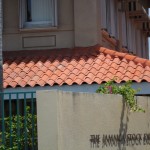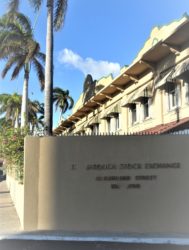
Republic Bank traded at a 52 weeks’ high of $102.92.
Trading on Trinidad & Tobago Stock Exchange ended on Thursday with 344,130 shares valued at $3,881,434 changing hands, compared to 214,080 shares valued at $2,940,696, on Wednesday.
Market activity ended with 12 securities changing hands compared to 17 trading on Thursday, and the market closed with 3 recording gains, 3 losses and 6 ending with prices unchanged. At the close of trading two stocks ended at 52 weeks’ closing highs and one at a low.
At the close the Composite Index lost 0.14 points on Thursday to 1,231.12, the All T&T Index added 0.05 points to 1,712.14 and the Cross Listed Index lost 0.04 points to 100.83.
IC bid-offer Indicator| At the close of trading, the Investor’s Choice bid-offer indicator reading shows market sentiment with 2 stocks ending with higher bids than the last selling prices and 4 with lower offers.
Stocks with Gains| Republic Financial Holdings concluded trading of 474 shares and gained 4 cents and ended at a 52 weeks’ high of at $102.92, Scotiabank added 1 cent in completing trading at $65.02, after exchanging 5,800 units and Trinidad & Tobago NGL increased 27 cents and settled at a 52 weeks’ high of $30.01, after exchanging 8,879 shares.
Stocks Losses| First Citizens closed with a loss of 1 cent at $35, after exchanging 1,516 shares,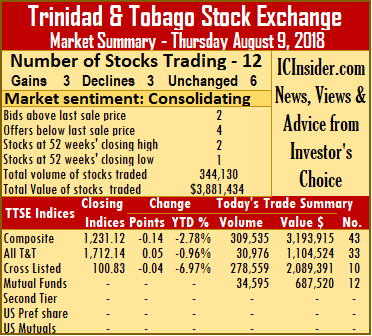
National Enterprises shed 50 cents and ended at a 52 weeks’ low of $9, with 2,310 stock units changing hands and West Indian Tobacco lost 1 cent and completed trading at $87.99, with 2,497 units.
Firm Trades| Ansa Merchant settled at $40, after exchanging 1,000 shares, Clico Investments ended at $20, with 34,595 stock units changing hands, First Caribbean International Bank completed trading 200 units at $8.49, National Flour ended trading 2,500 units at $1.79, One Caribbean Media concluded market activity at $12.36, after exchanging 6,000 shares and Sagicor Financial ended at $7.50, with 278,359 stock units changing hands.
Prices of securities trading for the day are those at which the last trade took place.
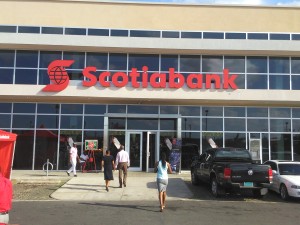
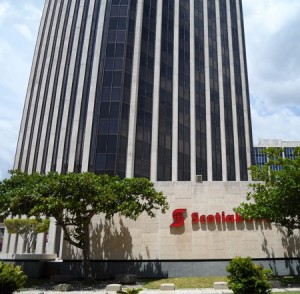
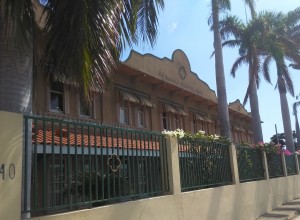
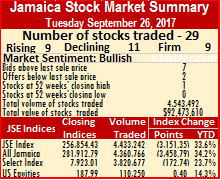 IC bid-offer Indicator| At the end of trading in the main and US dollar markets, the Investor’s Choice bid-offer indicator reading shows 7 stocks with bids higher than their last selling prices and 2 with lower offers.
IC bid-offer Indicator| At the end of trading in the main and US dollar markets, the Investor’s Choice bid-offer indicator reading shows 7 stocks with bids higher than their last selling prices and 2 with lower offers.
 IC bid-offer Indicator| At the end of trading in the main and US dollar markets, the Investor’s Choice bid-offer indicator reading shows 8 stocks with bids higher than their last selling prices and 2 with lower offers.
IC bid-offer Indicator| At the end of trading in the main and US dollar markets, the Investor’s Choice bid-offer indicator reading shows 8 stocks with bids higher than their last selling prices and 2 with lower offers.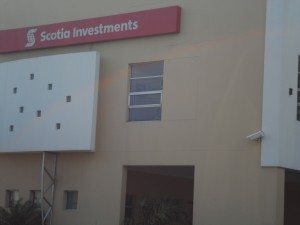 Scotia investments
Scotia investments  Well it was not until late 2016 that the price exceeded the 2005 high.
Well it was not until late 2016 that the price exceeded the 2005 high.  The past week saw much changes in the main and junior markets as prices gyrated up and down, for several of the stocks. Some of the highly valued stocks, declined in value as some investors took profit from the sharp rise since the start of 2017, for a number of stocks.
The past week saw much changes in the main and junior markets as prices gyrated up and down, for several of the stocks. Some of the highly valued stocks, declined in value as some investors took profit from the sharp rise since the start of 2017, for a number of stocks. 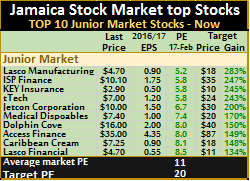 out of the list, with the bid at $12.50, making space for
out of the list, with the bid at $12.50, making space for 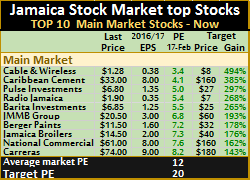
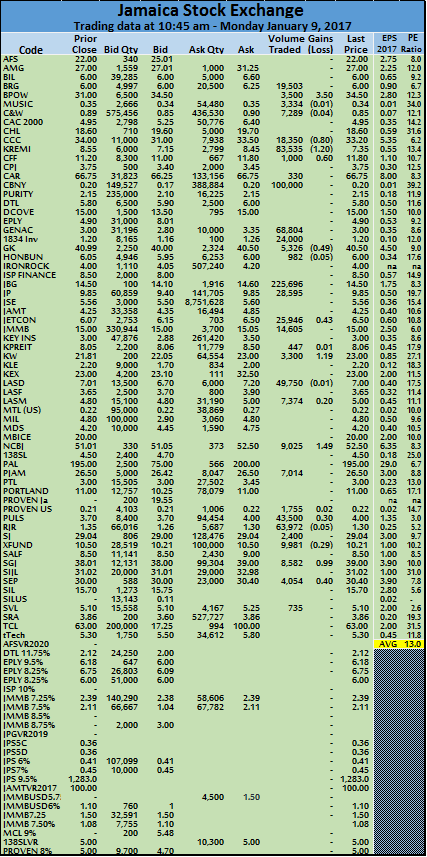 Market activity was helped by National Commercial Bank rising to $52.50, with 7,180 shares up from a last trade on Friday of $51.01, Scotia Group trading 8,582 units at $39, representing a rise of 99 cents from Friday’s close. In the junior market, Blue Power jumped $3.50 to a new all-time high of $34.50 with 3,500 units changing hands, Caribbean Cream fell back from Friday’s close of $8.55 to trade at $7.35 with 83,535 units and Jetcon Corporation with 25,946 units traded at a new high of $6.50. Caribbean Cement dropped $3.50 with 9,350 shares to $30.50 but recovered partially to traded 18,350 units up to $33.20.
Market activity was helped by National Commercial Bank rising to $52.50, with 7,180 shares up from a last trade on Friday of $51.01, Scotia Group trading 8,582 units at $39, representing a rise of 99 cents from Friday’s close. In the junior market, Blue Power jumped $3.50 to a new all-time high of $34.50 with 3,500 units changing hands, Caribbean Cream fell back from Friday’s close of $8.55 to trade at $7.35 with 83,535 units and Jetcon Corporation with 25,946 units traded at a new high of $6.50. Caribbean Cement dropped $3.50 with 9,350 shares to $30.50 but recovered partially to traded 18,350 units up to $33.20.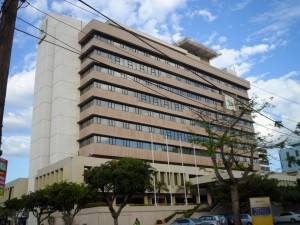
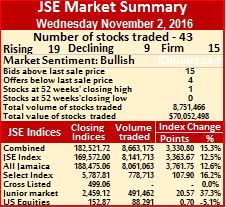 The average trade for the day in the main market ended at 330,400 and month to date 312,605 units. On Tuesday, an average of 294,810 units traded. The average for the October was 220,811 units.
The average trade for the day in the main market ended at 330,400 and month to date 312,605 units. On Tuesday, an average of 294,810 units traded. The average for the October was 220,811 units.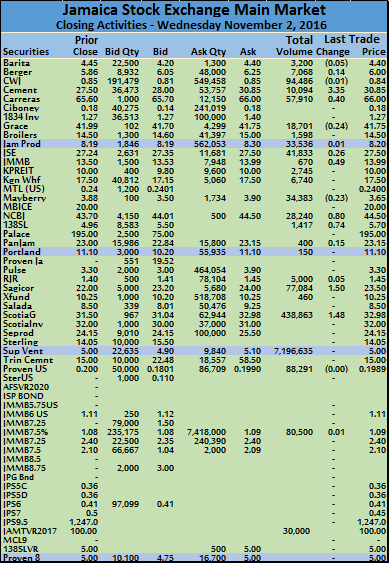 Jamaica Stock Exchange rose 26 cents and ended at $27.50 while trading 41,833 shares. JMMB Group traded just 670 shares and rose 49 cents to end at $13.99, Kingston Wharves traded 6,740 shares to close at $17.50, Mayberry Investments fell 23 cents and ended with 34,383 shares trading at $3.65, National Commercial Bank rose 80 cents in trading 28,240 shares to close at $44.50. Radio Jamaica gained 5 cents and closed at $1.45 after trading 5,000 shares, Sagicor Group had 77,084 shares changing hands and jumped $1.50 to close at $23.50. Scotia Group jumped $1.48 in trading 438,863 shares to close at $32.98, Supreme Ventures traded 7,196,635 shares to end at $5, Proven Investments traded 88,291 units at 19.89 US cents down from 20 US cents and JMMB Group 7.50% preference shares rose 1 cent and traded 80,500 units at $1.09.
Jamaica Stock Exchange rose 26 cents and ended at $27.50 while trading 41,833 shares. JMMB Group traded just 670 shares and rose 49 cents to end at $13.99, Kingston Wharves traded 6,740 shares to close at $17.50, Mayberry Investments fell 23 cents and ended with 34,383 shares trading at $3.65, National Commercial Bank rose 80 cents in trading 28,240 shares to close at $44.50. Radio Jamaica gained 5 cents and closed at $1.45 after trading 5,000 shares, Sagicor Group had 77,084 shares changing hands and jumped $1.50 to close at $23.50. Scotia Group jumped $1.48 in trading 438,863 shares to close at $32.98, Supreme Ventures traded 7,196,635 shares to end at $5, Proven Investments traded 88,291 units at 19.89 US cents down from 20 US cents and JMMB Group 7.50% preference shares rose 1 cent and traded 80,500 units at $1.09.




